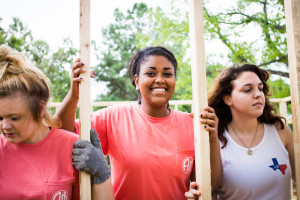>> For >>820,000 NC children, summer means more than being hot and bored. These kids receive free or reduced lunch during the school year — and now that it’s summer, they can no longer depend on school meals. Meanwhile, there is a simultaneous drop in volunteer activity and funding as financially-stable North Carolinians divert attention to vacations and caring for their own kids.
For >>820,000 NC children, summer means more than being hot and bored. These kids receive free or reduced lunch during the school year — and now that it’s summer, they can no longer depend on school meals. Meanwhile, there is a simultaneous drop in volunteer activity and funding as financially-stable North Carolinians divert attention to vacations and caring for their own kids.
Teenagers who could volunteer during the summer say that the >>message they’re receiving is that personal achievement takes precedence over philanthropy.
How do we raise kinder kids who connect with their communities?
Here are 10 ways to get your kids into giving back:
- Model behavior. Despite selective hearing loss around chore-completion, children are actually paying attention. Note how you treat or talk about people in front of them– >>more rubs off than you think.
- Offer >>opportunities to practice kindness. Encourage compassion and allow children to act on their humanitarian impulses. Remind them of how the “little things” like condolence cards or kind words to a person in need can make a big difference.
- Make big picture/small picture connections. Share >>age-appropriate current world events and engage your child in drawing parallels between these and what they see happening locally. They may surprise you with their insights.
- Identify organizations. Not every person has passion for the same things. Help your child locate local opportunities to give back to their community that also aligns with their personal interests — this will help them keep motivated when things get tough. There are some >>great places online to research what’s available.
- Volunteer. >>Get out there and DO something. Accompany your child to a homeless shelter or Habitat re-build. Refer to #1 if you have questions as to why.
- Make human connections. I know this sounds crazy – but encourage your child to talk to strangers. The more interactions they have with people, the less “difference” they will see. >>Empathy springs from proximity.
- Process feelings. The ability to identify and reckon with emotion is not inborn. As your children begin to volunteer, they may have a lot of things come up. Guilt, shame, anger, and frustration are completely normal reactions to the injustices. Be their >>emotional coach.
- Do more than “>>Liking.” Explain that, though charity work and volunteerism is very important, in order to create real change we have to get at the systemic reasons behind human need. This feels like a heavy one, but it is crucial — and kids tend to get it.
- Help grow activists. Hang up the notion that kids are functioning as “potential adults.” They are fully realized human beings right now and have agency to enact change. Connect with groups that are >>using kid-power to leverage social messages, bring them to rallies and events. Even better- >>have them come up with their own ideas.
- Carry forward. Don’t let the end of summer bring a halt to your activities. Ask your child how they can stay involved. Fall brings great opportunities to get schools and peer-groups invested in projects. Remember, the need doesn’t go away when you do.
>> Leanne Simon is a mother, writer, and social justice worker. She holds degrees in Child Development and Spanish from NCCU, and is currently pursuing a Masters in Peace and Conflict Studies at UNC-G.
Leanne Simon is a mother, writer, and social justice worker. She holds degrees in Child Development and Spanish from NCCU, and is currently pursuing a Masters in Peace and Conflict Studies at UNC-G.
There are no comments
Add yours